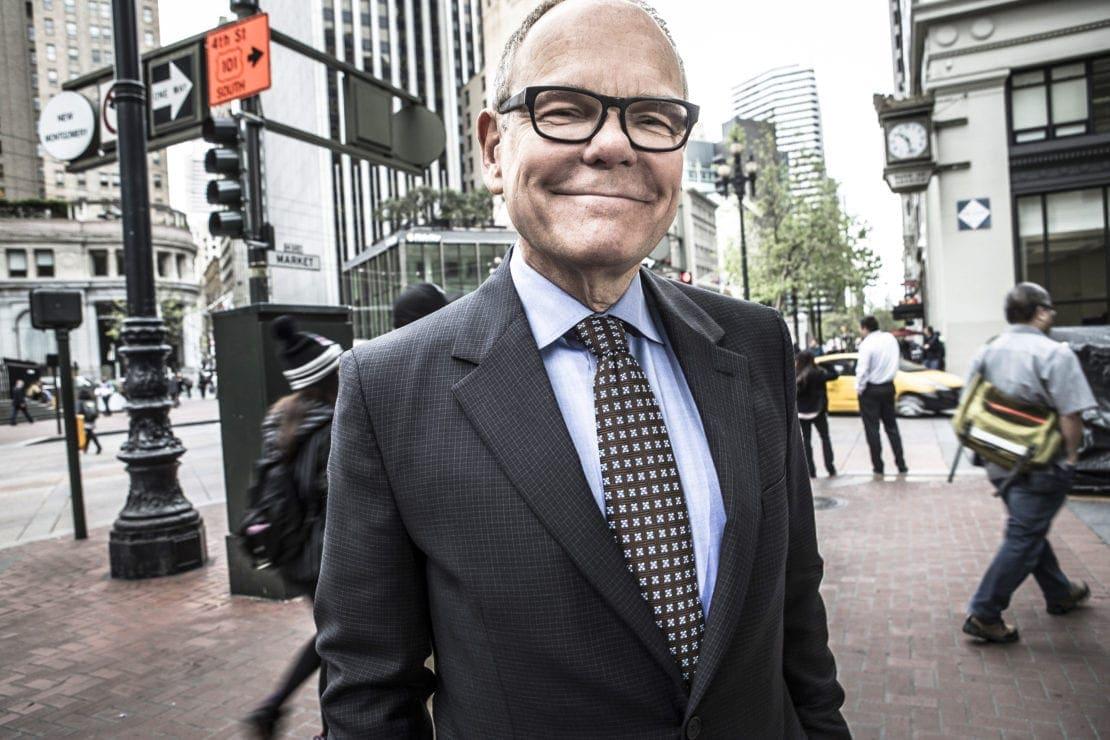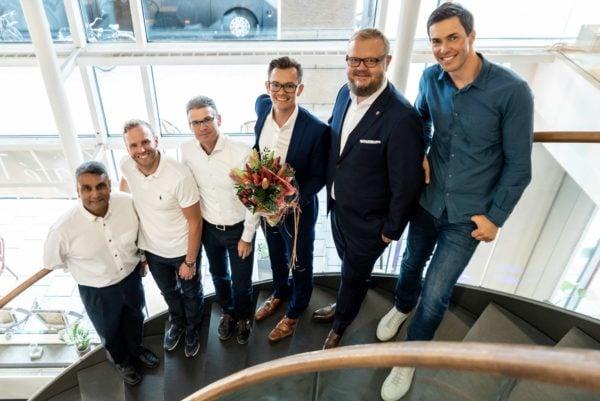22Aug2018
About Don Tapscott
Don Tapscott, CEO of The Tapscott Group, is one of the world’s leading authorities on the impact of technology on business and society. He has authored over 15 books, including Wikinomics: How Mass Collaboration Changes Everything, which has been translated into over 25 languages. Don has been advancing groundbreaking concepts for over 3 decades. His 1992 bestseller, Paradigm Shift, helped coin this seminal management concept, and The Digital Economy, written in 1995, changed business thinking about the transformational nature of the internet. Two years later he helped popularize the terms “Net Generation” and “the Digital Divide” in Growing Up Digital.
Don’s most recent and ambitious book was co-authored with his son, startup CEO and bitcoin governance expert Alex Tapscott. Blockchain Revolution: How the Technology Underlying Bitcoin is Changing Business, Money and the World was published in May 2016 and is, according to Harvard Business School’s Clay Christensen, “the book, literally, on how to survive and thrive in this next wave of technology-driven disruption.”
In 2017, Don and Alex co-founded the Blockchain Research Institute whose 70+ projects are the definitive investigation into blockchain strategy, use-cases, implementation challenges and organizational transformations. We sat down with Don to speak about his upcoming session at Nordic Business Forum 2018 entitled, “Winning in the Second Era of the internet”.
Speaker Spotlight Interview
Nordic Business Forum: Hi Don! Great to have you with us today. In September, you’ll be talking about “Winning in the Second Era of the internet” – could you help us understand what this means?
Don Tapscott: Sure. Well, the foundation for all of this is that we view blockchain, the underlying technology of cryptocurrencies, as the second era of the internet. And the first era was an internet of information. And when I send you some information, I’m actually sending you a copy, and that works fine for information, but it doesn’t work well for assets. Things like money, stocks, bonds, intellectual property, identities, and so on. So why Bitcoin is important is because, in 2008, Satoshi Nakamoto solved what’s called the “Double Spend Problem” that is with assets. If I send you some money, it’s really important that I don’t still have the money and that I can’t send it to somebody else. So Bitcoin is sort of like email. It’s the first application of the internet of information, whereas blockchain is the underlying technology that makes it work. It’s like the internet or the internet of value. And what we’re seeing now is new platforms emerge, like Ethereum, Icon, Aeon, Polkadot, Cosmos, and so on, that look more like the world wide web. They’re platforms whereby you can build any application on the platform.
NBForum: If someone is trying to understand blockchain without any background in it, and they want to see the benefits for their business, where would you recommend that they start?
DT: Well, they should start by watching my TED Talk! It’s 18 minutes and it’s a great introduction to the topic. Second thing I’d recommend is that they read Blockchain Revolution – it’s the best-selling book on the topic. It’s translated into 18 languages and it’s a great overview. It holds up really, really well. And in English, we just published a new edition of the book. It’s got 25,000 new words and there were a lot of important developments that have occurred since the book was written. For example, the whole question of so-called ICOs or crowd-funding on a blockchain. We get into that, explain how these issuances of tokens are very different. There are, in fact, seven different types of these things. And that’s going to bring a lot of clarity, we think, to the marketplace. Beyond that, I would say, the first thing you can do is get a Google Alert on the word “blockchain”. Every day, you’ll be staggered with the new kinds of things that are being announced. I’d also recommend that you get a digital wallet. It’ll take you three minutes to download a wallet onto your mobile device. And then go buy something like Bitcoin and spend it, and you’ll learn more about public key cryptography in 10 minutes than if I talk to you all day long. And then, within the framework of a company, you need to find who are the people in your company that are knowledgeable and interested. And in every company, there are people like that.
NBForum: Why should companies care about blockchain?
DT: Well, this is 1995, and why should companies care about the internet? The internet changed many things about business. And blockchain is going to change things in an even more profound way because the internet was simply about information. But blockchain is really about value, and value is the foundation of every corporation – money, asset, intellectual property, identities, contracts. These are the things that really, really matter. So it’s like companies that ignored the internet in the early 1990s sort of did so at their peril, and the same is true for blockchain.
When we talk about blockchain we talk about cryptocurrencies, but cryptocurrencies are only one of many, many different types of tokens that we’re talking about. There are cryptocurrencies, but there are also what we call platforms, things like Ethereum or AON, ICON, etc. Currency is the first application, sort of like the first application of the internet of information. But these new platforms look more like the world wide web where you can build any application on that. There are also new tokens called utility tokens that enable something to work, like with the Golen Network, which is a distributor resource network trying to replace the cloud. Golen needs a token or some kind of store value to motivate people to use the token. Web security is a token. These represent some kind of security. We also have what we would call natural asset tokens. These can represent something like carbon or a synthetic asset. Natural asset tokens are very important, and it’s important that regulators don’t get involved in trying to somehow restrict them. Then, we also have crypto-collectible. You could never create some digital art before on the internet because anyone could publish it or print it. That’s how the internet was. But, now, the double-spend problem has been solved, so you can have some kind of digital collectible that can be created, and collected, and it’s unique and non-replicable. The final one is what we call crypto-fiat currency. These are currencies that are controlled by a nation state or country. Every country around the world will eventually do this, so we’ll talk block-chaining for their national currency.
So when we talk about currencies, we need to remember that so-called cryptocurrency is only one of seven different types that are out there. Every one of them has a different function, like a toolkit. If you’re a business, you need to use different tools to solve different problems.
NBForum: How do you see blockchain and the public ledger affecting how industries like accounting will function? In fact, what does the future of business look like from your perspective?
DT: Well, it’ll certainly change jobs because, with blockchain, we move beyond our traditional models of accounting. So, for hundreds of years, we’ve had what we call double-entry accounting in debit and credit. Now, with blockchain, there are triple-entry accounting models where you have a third entry that’s automatically added in real-time to the audit trail and left on the blockchain. This means that you won’t have companies like KPMG or Deloitte coming in at the end of the year to do an audit. They can do an audit at any time in order to see a sample of the information. It will be an actual population. They’ll know about every transaction that has occurred because all of that is stored on the blockchain. So companies like KPMG are really smart. They understand this is going to be good for them because they will be able to deliver better value to customers. They’ll probably be able to bill higher billing for it as well because billing is generally based on value.
And it’s going to affect every industry for sure. And every business within every industry. A really big one is something like the supply chain. This is a $50 trillion industry around the world. And right now, things move along through super-complicated serial supply chains. You’ve got trains, and boats, and planes, shippers, and trucks, and borders, and tax authorities, and clearinghouses, and all kinds of things. But with blockchain, you’ll be able to look at a shared network state and see all of that in real-time. Have a single version of the truth. So that’s huge, $50 trillion, and that’s one of many, many ways technology is changing business. Big disruptors like Uber and Airbnb could be destructed. You don’t need a $50 billion corporation called Uber when all of that could be handled by software on a blockchain. And this is a time of very profound change. We need to be careful combining blockchain and artificial intelligence. This is a very, very powerful technology. One that has no people and that, ultimately, will cause a need for new social contracts in society. We’ll need to rethink what a job is, but also make sure that these things don’t go bad because some of these autonomous agents from a blockchain go bad. They essentially become sort of viruses with a bank account. And they can go around doing bad things, hiring people to do bad things and so on. So it’s very important that we think this through and get it right. Both in terms of the technology, how it’s implemented, and also in terms of its broader social implications.
But, as with all things, mistakes are bound to happen in this second era. And that’s why we created The Blockchain Research Institute. And this is funded by many of the biggest companies in the world. And our goal is to make sure that people don’t make mistakes and that they understand the strategic opportunities of the technology and take full advantage of it. We’re doing 80 projects right now. And these projects are all led by the world’s leading thinkers. The goal of these projects is to help companies do the right thing and succeed.
NBForum: If people reading this interview learn only one thing from you, what should it be?
DT: That blockchain is a second era of the internet. We’ve had an internet of information, we’re now getting an internet of value. And this is 1995. Imagine you knew back then what you know now. Well, by doing stuff like studying, reading Blockchain Revolution, doing the other things I recommended, you can know now what people will know in years from now. And this will make all the difference in the world for your business and for you as an individual.
About Nordic Business Forum 2018
Nordic Business Forum will host its 9th annual business and leadership conference by the same name in Helsinki on the 26th and 27th of September 2018 for 7,500 C-level executives and business owners. Our 2018 main event will bring to the stage some of the world’s preeminent experts on strategy, artificial intelligence, and peak performance for two action-packed days.
NBForum 2018 is a place where you will uncover strategic success principles, discover how to apply new technologies to win in business, and learn how to drive and sustain personal performance. It’s also THE place to network and drive business development. The networking opportunities presented by our guests are unparalleled in the Nordics. You’re getting more than just a conference ticket — you’re getting access to some of the greatest business minds on the planet!
Nordic Business Forum is Europe’s leading conference organizer with events in Finland, Sweden, and Norway. Our 2018 event is sold out, but you can tune in to the event from anywhere in the world with our live stream licenses, which are tailored to individuals and groups (communities).

 by:
by: 
